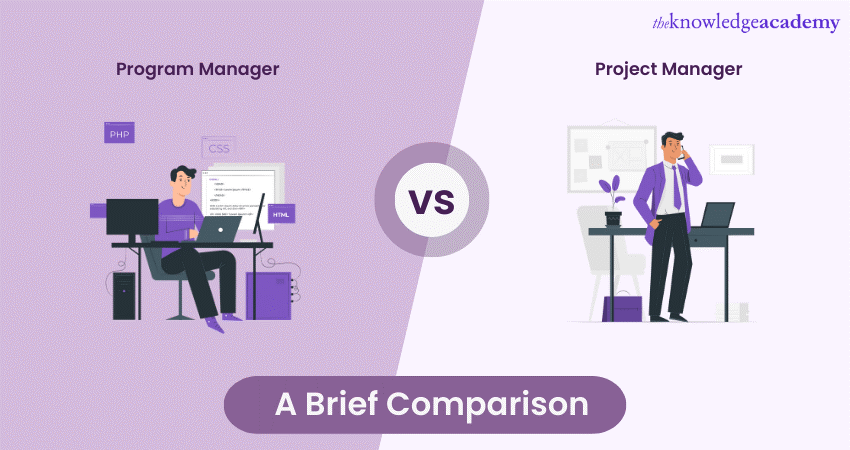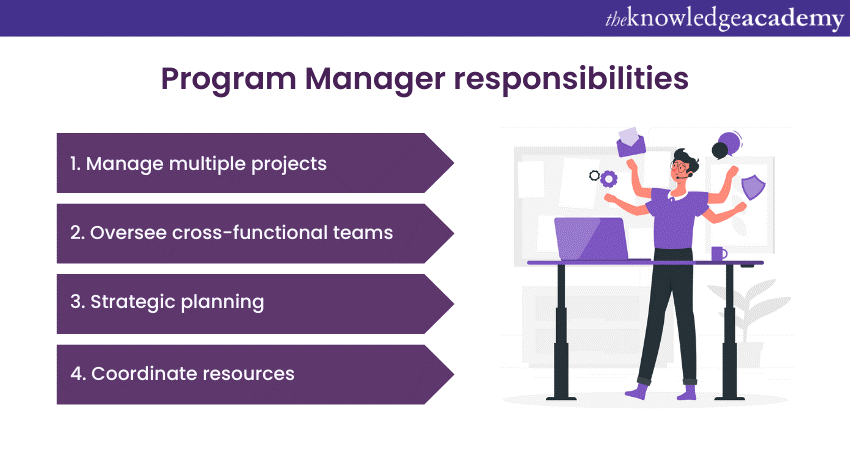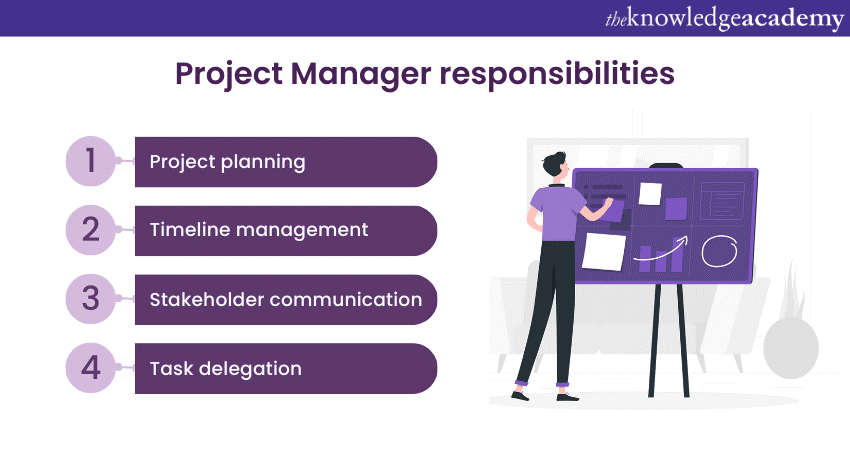We may not have the course you’re looking for. If you enquire or give us a call on +800 312616 and speak to our training experts, we may still be able to help with your training requirements.
Training Outcomes Within Your Budget!
We ensure quality, budget-alignment, and timely delivery by our expert instructors.

In today's complex business landscape, the roles of Program Managers and Project Managers are vital for the successful execution and delivery of initiatives. While one oversees multiple interrelated projects within a program, the other focuses on the execution of a specific project, driving. Both roles are essential, but understanding the distinctions between Program Manager vs. Project Manager is crucial for effective project management.
Understanding the unique responsibilities and the differences between Program Managers and Project Managers is essential for organisations. It allows stakeholders to allocate resources appropriately, ensure efficient collaboration, and optimise project outcomes. The clear distinctions between these roles enable effective decision-making, strategic planning, and streamlined execution. Read this blog for a detailed analysis of Program Manager vs Project Manager, their roles and responsibilities, key differences and similarities.
Table of Contents
1) Role and responsibilities of Program Managers
2) Role and responsibilities of Project Managers
3) The similarities between a Program Manager and a Project Managers
4) Program Manager vs Project Manager: Key differences
5) Conclusion
Role and responsibilities of Program Managers

Program Managers are critical in driving complex initiatives' success by overseeing multiple interrelated projects within a program. Their role encompasses various responsibilities, including strategic focus, resource allocation, risk management, and effective communication. The following are some of their primary roles and responsibilities:
a) Strategic focus: Program Managers must maintain a strategic focus to ensure that the program's objectives align with the organisation's broader goals and vision. They work closely with stakeholders to define the program's scope, establish strategic direction, and identify key deliverables. By understanding the overall strategic landscape, Program Managers make informed decisions that drive the program's success and contribute to the organisation's long-term objectives.
b) Resource allocation: It is a vital aspect of program management. Program Management assess the resource requirements across various projects within the program and allocate them efficiently. This involves evaluating the availability of resources, considering their skills and expertise, and ensuring that teams have the necessary support to execute their tasks effectively. Managing budgets, equipment, and human resources are crucial aspects of resource allocation, enabling Program Managers to optimise project outcomes and deliver results within the defined constraints.
c) Risk management: Managing risk is another significant responsibility of Program Managers. They proactively identify and assess risks at the program level, considering both internal and external factors that may impact project success. By conducting thorough risk assessments, Program Managers develop strategies to mitigate potential risks and establish contingency plans.
The managers continuously monitor risks throughout the program's lifecycle, making adjustments and implementing preventive measures to ensure the program stays on track and achieves its desired outcomes.
d) Communication: Effective communication is paramount in Program Management. Program Managers facilitate clear and consistent communication between stakeholders, project teams, and senior leadership. They provide regular updates on program progress, share important information, and foster collaboration among project teams.
Effective communication in the management process involves conducting regular meetings, preparing reports, and establishing communication channels that promote transparency, trust, and effective information sharing. By promoting open communication, Program Managers ensure all stakeholders are well-informed, aligned, and actively engaged in the program's activities.
Become a Project Manager with our Project Management Courses
Role and responsibilities of Project Manager

Project Managers are vital in the successful execution and delivery of specific projects. They oversee every stage of a project, from initiation to completion. Their main goal is to ensure the project objectives are met within the given scope, budget, and timeline. Let's delve into the role of a Project Manager and their primary responsibilities.
a) Coordination: The role of a Project Manager is the driving force behind the project's success. They act as the central point of coordination, leading and managing the project team and ensuring that all project activities are carried out effectively. Project Managers are responsible for planning, organising, executing, and monitoring every project phase.
b) Focus: Project-specific focus is a key aspect of a Project Manager's role. They define project goals, deliverables, and success criteria in collaboration with stakeholders. Project Managers establish a clear project scope, identifying the specific tasks, milestones, and deadlines to achieve project objectives. They create comprehensive project plans, outlining the required resources, timelines, and dependencies.
c) Task execution: It is another primary responsibility of Project Managers. They allocate tasks to team members, monitor progress, and ensure activities are completed according to plan. Project Managers track project timelines, manage resources, and address any obstacles hindering the project's growth. They are skilled at balancing competing priorities and adapting plans when necessary to keep the project on track.
d) Stakeholder management: It is a critical aspect of Project Management. Project Managers establish effective communication channels with stakeholders, ensuring their expectations and requirements are understood and addressed. They actively engage stakeholders throughout the project lifecycle, soliciting feedback, managing concerns, and providing regular updates on project progress. Project Managers build strong relationships with stakeholders, fostering collaboration and ensuring alignment with project goals.
e) Risk mitigation: It is a crucial responsibility of Project Managers. They identify potential risks and develop strategies to minimise their impact on the project. They conduct risk assessments, implement risk mitigation plans, and monitor risks throughout the project's lifecycle. They proactively identify issues, anticipate challenges, and take measures which ensure the project stays on track. Effective risk management enables Project Managers to navigate uncertainties and deliver successful outcomes.
Try our Introduction to Project Management Certification Course today!
The similarities between a Program Manager and a Project Manager
Despite their distinct roles and responsibilities, Program and Project Managers also share similarities in managing initiatives. In order to understand their similarities, exploring the differences between Program Manager vs. Project Manager is essential. Let's explore some of the key similarities between these two roles.
Leadership and management
Both Program Managers and Project Managers possess strong leadership and management skills. They are responsible for guiding teams, making critical decisions, and ensuring effective execution of tasks. Both roles require motivating and inspiring team members, fostering collaboration, and driving project success.
Stakeholder engagement
Program Managers and Project Managers recognise the importance of stakeholder engagement. They understand that engaging stakeholders throughout the project or program lifecycle are crucial for obtaining buy-in, managing expectations, and ensuring alignment with project goals. Both roles involve regular communication, stakeholder analysis, and relationship-building to foster collaboration and achieve successful outcomes.
Problem-solving
Program Managers and Project Managers are skilled problem solvers. They encounter various challenges and obstacles during their work, requiring them to identify solutions, make decisions, and navigate uncertainties. Both roles involve analysing complex situations, evaluating alternatives, and implementing strategies to address issues and keep projects or programs on track.
Communication skills
Effective communication is vital for both Program Managers and Project Managers. They must communicate clearly and concisely with stakeholders, team members, and senior leadership to provide updates, share important information, and foster collaboration. Both roles require the ability to adapt communication styles to various audiences, actively listen, and convey messages compellingly and persuasively.
Results orientation
Program Managers and Project Managers are results-oriented professionals. They are focused on delivering successful outcomes, whether it's achieving a specific project's objectives or driving a program's overall success. Both roles require keen attention to detail, a commitment to quality, and a drive to meet or exceed project expectations.
Adaptability
Both Program and Project Managers must be adaptable and flexible in their approach. They operate in dynamic environments where changes and uncertainties are common. They must be able to adjust plans, reallocate resources, and manage shifting priorities effectively. Adaptability is crucial in navigating unforeseen challenges and ensuring project or program success.
Try our Project Management Office Fundamentals Certification Course!
Program Manager vs Project Manager: Key differences

Program and Project Managers play an essential part in successfully executing initiatives, but they have distinct roles and responsibilities. Let's explore the key differences between Program Manager vs. Project Manager in scope, timeframes, strategic focus, resource management, risk management, and communication.
In terms of scope, Program Managers oversee multiple interrelated projects within a program, whereas Project Managers are responsible for the execution and delivery of a specific project. Program Managers have a broader scope, focusing on aligning multiple projects with strategic objectives and ensuring overall program success. Project Managers have a narrower scope, concentrating on achieving specific project goals within defined parameters.
Timeframes differ between Program Managers and Project Managers. Program Managers typically work with longer timeframes, overseeing programs that may span several years. They manage the overall program timeline and coordinate project timelines within it. On the other hand, Project Managers operate within shorter timeframes, managing the project's timeline from initiation to completion, which could range from a few months to a couple of years.
Strategic focus varies between the two roles. Program Managers have a strategic focus, aligning the program's objectives with the organisation's broader goals. They consider the program's long-term impact, strategic fit, and overall benefits. Project Managers have a project-specific focus, concentrating on delivering the project's objectives within the defined parameters, such as scope, budget, and timeline.
Resource management responsibilities differ for Program Managers and Project Managers. Program Managers are responsible for managing resources across multiple projects within the program. They assess resource requirements, allocate resources efficiently, and optimise resource utilisation across projects. Project Managers primarily focus on managing resources within their specific project, ensuring that the necessary personnel, equipment, and materials are available to complete project tasks successfully.
Risk management approaches also vary between Program Managers and Project Managers. Program Managers deal with higher-level risks that can impact the overall program. They identify, assess, and mitigate risks at the program level, considering the collective impact on multiple projects. Project Managers focus on project-specific risks, identifying and mitigating potential challenges that could impact the successful delivery of their specific project.
Communication is crucial for both program and Project Managers, but the focus and scope differ. Program Managers facilitate communication across multiple projects, ensuring effective collaboration and information sharing among project teams and stakeholders.
They communicate program-level updates, strategic decisions, and progress reports to stakeholders. Project Managers primarily focus on project-level communication, coordinating with the project team, stakeholders, and senior leadership to provide regular updates, address concerns, and ensure alignment.
Recognising the unique contributions of each role is vital for successful project and program outcomes. Program Managers bring a strategic perspective, aligning projects with organisational goals, optimising resources, and managing program-level risks.
Project Managers excel in driving project execution, managing project timelines, resources, and stakeholders, and mitigating project-specific risks. Both roles are crucial for effective project and program management, and their collaboration ensures seamless coordination, alignment, and achieving desired outcomes.

Conclusion
In conclusion, understanding the distinctions between Program Manager vs Project Manager is crucial for effective Project and Program Management. While they share some similarities, their roles, responsibilities, and focus differ significantly. Recognising and harnessing the unique contributions of each role is essential for achieving successful project and program outcomes.
Get certified with our Certified Digital Services Project Manager (CDSPM) Course!
Frequently Asked Questions
Upcoming Project Management Resources Batches & Dates
Date
 Introduction to Project Management Course
Introduction to Project Management Course
Fri 13th Dec 2024
Fri 10th Jan 2025
Fri 14th Feb 2025
Fri 14th Mar 2025
Fri 11th Apr 2025
Fri 9th May 2025
Fri 13th Jun 2025
Fri 18th Jul 2025
Fri 15th Aug 2025
Fri 12th Sep 2025
Fri 10th Oct 2025
Fri 14th Nov 2025
Fri 12th Dec 2025







 Top Rated Course
Top Rated Course


 If you wish to make any changes to your course, please
If you wish to make any changes to your course, please


